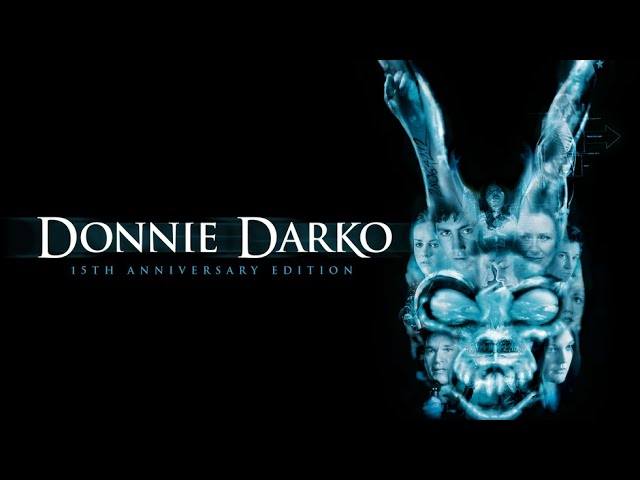Donnie Darko (2001)

Donnie Darko, directed and written by Richard Kelly, is a 2001 American psychological science fiction thriller that has captivated audiences with its enigmatic narrative and haunting atmosphere. Produced by Flower Films, the film stars Jake Gyllenhaal as the titular character, Donnie Darko, and features a compelling cast including Jena Malone, Mary McDonnell, Patrick Swayze, and Drew Barrymore. Through its intricate storytelling and exploration of complex themes, “Donnie Darko” stands as a unique and thought-provoking entry in the genre.
The film is set in 1988 and follows Donnie Darko, a troubled teenager who begins experiencing disturbing visions of a man in a grotesque rabbit costume named Frank. These visions predict catastrophic events and urge Donnie to commit various acts that seem to defy logic and reason. As Donnie navigates his disorienting reality, he uncovers a deeper conspiracy involving time travel, parallel universes, and existential questions about fate and free will.
Central to the film’s narrative is the theme of time travel and its impact on reality. The story explores the concept of the “Tangent Universe,” a parallel dimension that intersects with the primary timeline and influences Donnie’s actions and experiences. This theme is intricately tied to the film’s exploration of destiny and choice, raising questions about the nature of time and the possibility of altering one’s fate.
Another prominent theme in “Donnie Darko” is the struggle with mental illness and the search for personal identity. Donnie’s psychological challenges are portrayed with nuance, and his experiences highlight the difficulties of distinguishing between reality and delusion. The film also delves into themes of existential angst and the quest for meaning in a seemingly chaotic world.
Jake Gyllenhaal delivers a standout performance as Donnie Darko, capturing the character’s complexity and emotional depth. Gyllenhaal’s portrayal of Donnie is marked by a blend of vulnerability, intensity, and introspection. His ability to convey the character’s inner turmoil and sense of alienation adds a profound layer to the film’s exploration of mental health and identity.
The supporting cast also contributes significantly to the film’s impact. Jena Malone plays Gretchen Ross, Donnie’s love interest, whose relationship with Donnie provides both emotional support and a sense of normalcy amidst his turbulent experiences. Malone’s performance is heartfelt and genuine, adding depth to her character and to the romantic subplot.
Mary McDonnell, as Donnie’s mother, and Patrick Swayze, as a charismatic but morally ambiguous motivational speaker, further enrich the film’s character dynamics. McDonnell’s portrayal reflects the struggles of a family dealing with a troubled child, while Swayze’s role adds a layer of menace and complexity to the film’s exploration of societal influences.
Drew Barrymore, who also served as a producer, appears as Ms. Pomeroy, Donnie’s supportive teacher. Her performance helps to ground the film’s more fantastical elements, providing a sense of stability and empathy within the narrative.
Richard Kelly’s direction and screenplay are central to the film’s unique and enigmatic quality. Kelly’s approach combines elements of psychological thriller, science fiction, and teen drama, creating a film that is both intellectually stimulating and emotionally resonant. The screenplay’s intricate plotting and layered storytelling challenge the audience to engage with the film on multiple levels, encouraging viewers to delve into its themes and motifs.
Kelly’s direction is characterized by its atmospheric and surreal style, with a visual aesthetic that complements the film’s exploration of parallel dimensions and psychological complexity. The use of symbolism, dreamlike sequences, and a haunting soundtrack enhances the film’s overall impact, creating a distinctive and immersive experience.

The visual style of “Donnie Darko” is marked by its blend of realism and surrealism. The film’s cinematography, by Steven Poster, captures both the mundane aspects of suburban life and the unsettling, otherworldly elements that permeate Donnie’s experiences. The film’s use of lighting, camera angles, and special effects contributes to its dreamlike and disorienting atmosphere.
The tone of the film is a mixture of eerie suspense and emotional depth. The soundtrack, featuring songs from the era such as “Mad World” by Gary Jules, adds to the film’s melancholic and introspective mood. The combination of visual and auditory elements creates a haunting and memorable experience that lingers with the audience long after the credits roll.

“Donnie Darko” received critical acclaim for its originality, complexity, and thought-provoking themes. Despite a modest initial box office performance, the film gained a cult following and has since been recognized as a seminal work in the science fiction and psychological thriller genres. Critics praised the film for its innovative storytelling, strong performances, and its ability to challenge conventional narrative structures.
The film’s impact extends beyond its initial release, influencing a new generation of filmmakers and viewers. Its exploration of time travel, mental health, and existential questions continues to resonate with audiences, and its unique blend of genres has established it as a distinctive and influential piece of cinema.

In summary, “Donnie Darko” is a compelling and thought-provoking film that stands out for its innovative storytelling and exploration of complex themes. Directed and written by Richard Kelly, the film features a powerful performance by Jake Gyllenhaal and a strong supporting cast. Through its blend of psychological drama, science fiction, and existential inquiry, “Donnie Darko” offers a unique and enduring cinematic experience that continues to captivate and challenge audiences.











